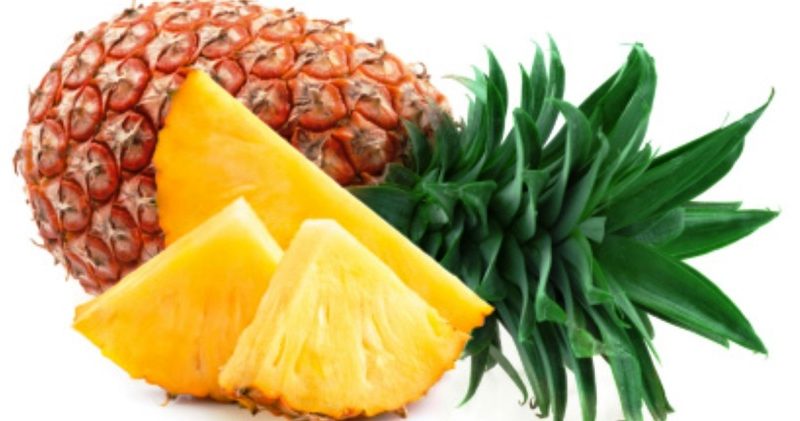Sweet juicy pineapple is nutritious and so delicious. Pineapples are a superfood that protects our hearts, helps with digestion, and fights cancer. All over the world, it is a favourite fruit. Christopher Columbus discovered it and took it back to Europe.
“Love is like a pineapple, sweet and undefinable.” ~ Piet Pieterszoon Hein
Health Benefits of Pineapples
-
Full of Dietary Fiber
Our body needs fiber and pineapple is full of it. “Individuals with high intakes of dietary fiber appear to be at significantly lower risk for developing coronary heart disease, stroke, hypertension, diabetes, obesity, and certain gastrointestinal diseases. Increasing fiber intake lowers blood pressure and serum cholesterol levels. Increased intake of soluble fiber improves glycemia and insulin sensitivity in non-diabetic and diabetic individuals.” ~ University of Kentucky
-
Helps Fight Cancer
Fresh pineapple juices from the flesh, core and stem were used in a study and it was found that it suppressed ovarian and colon cancer cells forming.
- Helps with Inflammation
Young children diagnosed with acute sinusitis in a study were given the enzyme bromelain obtained from pineapple and it was found to lessen their symptoms quicker than standard therapies.
Another study showed that supplementing with fresh or unpasteurized frozen pineapple juice decreased inflammation of the colon.
- Excellent for the Immune System
Pineapple has a high amount of Vitamin C which is well known to reduce coughs, colds, and flues. Children were fed with canned pineapple every day for nine weeks during a study in Manila, Philippines. What they found is that the average time of infections was much shorter for the children who ate canned pineapple compared with the children who didn’t.
- Aids Digestion
The enzyme bromelain in pineapple helps digest protein. It also helps with stomach upset and decreases the symptoms of ulcerative colitis.
- Helps Keep Your Heart Healthy
In a study, it was found that pineapple juice is protective for the heart and can help with digestion. Pineapples are full of fiber, potassium and Vitamin C which helps to keep the heart healthy. Also, with the high amount of antioxidants, it helps to reduce inflammation restoring healthy blood pressure.
Pineapple Nutrition
1 cup of pineapple chunks has 82 calories, 2 grams of fiber, and 131% of Vitamin C daily requirements.

History of the Pineapple
The first sightings of the pineapple have been found in pre-Inca ruins. It was a well-known fruit many centuries ago in South America, near Brazil and Paraguay; the indigenous people took it to Central America according to historical records.
Christopher Columbus discovered pineapples on the Caribbean Island of Guadalupe in 1493 and brought them back to Spain. Later the Spanish took them to the Philippines. In 1720, hothouses in Europe started growing pineapples. Finally, they were grown in Hawaii in the 18th century and are still the only state in the U.S. where they are still grown.
Pineapple Trivia
- Throughout history, pineapples were eaten to prevent scurvy.
- Also, historically pineapple juice was mixed with sand to clean boats.
- A pineapple takes from 18 months to 2 years to grow.
- The top 5 producers of pineapples are Philippines, Thailand, Costa Rica, Indonesia and Chile.
- ‘Ananas comosus’ is the scientific name for the pineapple. It is called ‘hala kahiki’ in Hawaii because they resemble the local fruit “Hana”.
- The name ‘pineapple’ was first recorded in 1398 to describe ‘pine cones’. Then in 1694 pine cones were first called pine cones. European explorers called the fruit pineapple in the 1600’s because they look like the pine cone.
Types of Pineapples
There are four main types of pineapples:
- The Gold
- Smooth Cayenne
- Red Spanish
- Sugar Loaf
The Gold pineapple is, of course, golden in color, has an extra sweet flavor, and the highest amount of vitamin C.

Selecting the Best Pineapple
- Pineapple can be found fresh or canned and all have a sweet flavour but the bromelain is destroyed in the canned ones.
- When buying fresh, the ones that are heavy for their size are best.
- Make sure there are no soft spots, bruises and darkened ‘eyes’ on the pineapple as that means it is past its prime.
- Be sure you get a ripe pineapple because once it is picked it will not ripen further. Smell the pineapple and find one with a fragrant sweet smell at the stem end. If it smells sour, musty, or fermented then it is one past its due date.
“When life gives you lemons, sell them and buy a pineapple.” ~ Davin Turney
How to Store
It is best to store a pineapple for 1 or 2 days at room temperature to let it become juicier and softer. Note: this will not make it sweeter as they don’t ripen further after picking. Keep an eye on your pineapple during this time as it can easily spoil (I had this happen before I knew this).
If you do not want to eat the pineapple after this period, then it is best to wrap it up and store in the refrigerator for 3 to 5 days. Cut up chunks can be stored in the refrigerator for up to 7 days. You can freeze the cut up pineapple too but the deliciousness of the pineapple gets lost.
Here are Some of My Favorite Pineapple Recipes

Fancy Pineapple Salsa – This pineapple salsa recipe is full of the healthy benefits of pineapple adding excitement to your party food, snacks or even a meal with this very tasty recipe.
Pineapple, Banana Turmeric Smoothie – This is a delicious smoothie that is extra healthy with the turmeric and chia seeds for you. A great breakfast!
100+ Superfoods
Learn more about some of the healthiest vegetarian foods you will always want to have in your pantry or growing on your deck.
READ: Superfoods – Over 100 of the Healthiest Foods You Should Have in Your Diet and learn more about the variety of Superfoods we think you should have in your diet.

